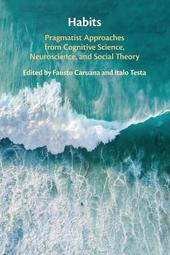
|
Habits: Pragmatist Approaches from Cognitive Science, Neuroscience, and Social Theory
Paperback / softback
Main Details
| Title |
Habits: Pragmatist Approaches from Cognitive Science, Neuroscience, and Social Theory
|
| Authors and Contributors |
Edited by Fausto Caruana
|
|
Edited by Italo Testa
|
| Physical Properties |
| Format:Paperback / softback | | Pages:478 | | Dimensions(mm): Height 229,Width 152 |
|
| Category/Genre | Philosophy of the mind
Philosophy - aesthetics
Neurosciences |
|---|
| ISBN/Barcode |
9781108736367
|
| Classifications | Dewey:152.33 |
|---|
| Audience | | Professional & Vocational | |
|---|
| Illustrations |
Worked examples or Exercises
|
|
Publishing Details |
| Publisher |
Cambridge University Press
|
| Imprint |
Cambridge University Press
|
| Publication Date |
4 August 2022 |
| Publication Country |
United Kingdom
|
Description
This book evaluates the potential of the pragmatist notion of habit possesses to influence current debates at the crossroads between philosophy, cognitive sciences, neurosciences, and social theory. It deals with the different aspects of the pragmatic turn involved in 4E cognitive science and traces back the roots of such a pragmatic turn to both classical and contemporary pragmatism. Written by renowned philosophers, cognitive scientists, neuroscientists, and social theorists, this volume fills the need for an interdisciplinary account of the role of 'habit'. Researchers interested in the philosophy of mind, cognitive science, neuroscience, psychology, social theory, and social ontology will need this book to fully understand the pragmatist turn in current research on mind, action and society.
Author Biography
Fausto Caruana is a research scientist at the Institute of Neuroscience of the Italian National Research Council (CNR) in Parma. He is specialized in social, cognitive and affective neuroscience with a focus on the neural and psychological mechanisms underlying emotions, empathy, mirror neurons, and motor cognition. Italo Testa is Associate Professor at the University of Parma, Italy, where he researches critical theory, pragmatism, embodied cognition, social ontology, and German classical philosophy with a focus on the notions of second nature and theory of recognition.
Reviews'This informative and ground-breaking anthology is an invaluable resource for anyone trying to reimagine the foundations of the mind. Exploring the concept of habit through the lens of pragmatism, the book maps out pragmatist positions and how such positions can extend, embed, enact, and embody current debates in the cognitive and social sciences.' Ellen Fridland, Lecturer in Philosophy, King's College London, UK 'This volume offers a fascinating, interdisciplinary approach to understanding important questions about habits. With an emphasis on dissolving the dualism between the automatic actions of the body and the deliberate movements of the mind, it leaves one wondering whether the twilight of philosophy of the mind, as it is traditionally practiced, is approaching.' Barbara Gail Montero, Professor of Philosophy, City University of New York, USA 'The authors give us what we need: a place to begin. This landmark book takes a much-needed jump in the right direction by placing habit in the center of our field. I don't think you can study habit without using the original contributions assembled here.' Alva Noe, Professor of Philosophy, University of California at Berkeley, USA 'A great book in which philosophers, psychologists and neuroscientists explore how habits arise and shape many critical features of our social and cultural life.' Corrado Sinigaglia, Professor of Philosophy of Science, University of Milan, Italy 'Philosophers and neuroscientists have long treated habitual actions as reason's shadow, as rigid mechanical routines. This stunning collection of essays excavates a rich counter-history of the neurophilosophy of habits. The contributors combine rigorous original scholarship with ambitious updates of the great pragmatist philosophers' subtle views on embodied cognition and human plasticity.' John Sutton, Professor of Cognitive Science, Macquarie University, Australia
|